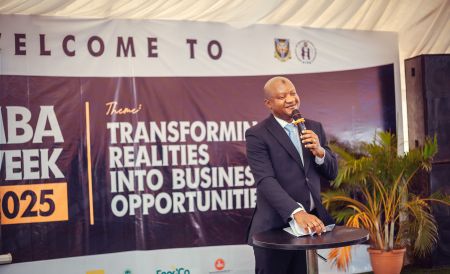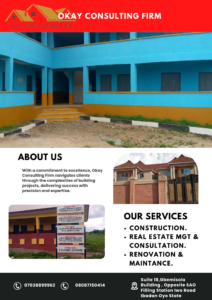UI MBA Week: Barr Akeem Agbaje Advocates Sustainable Enterprise and Ethical Leadership

Prominent legal mind, entrepreneur, and 2027 Oyo State governorship hopeful under the All Progressives Congress (APC), Barr. Akeem Adedeji Agbaje, has urged Nigerian entrepreneurs, policymakers, and business students to shift focus from short-term profit to long-term sustainability, innovation, and institutional legacy.

He made this call while delivering a keynote address titled “Business Development and Maintenance in Nigeria: Building Institutions That Outlive Us” at the 2025 MBA Week of the University of Ibadan School of Business (UISB) on Wednesday, October 15, 2025.
Addressing an audience of scholars, professionals, and students, Barr. Agbaje described Nigeria as “a nation of ideas but weak systems,” emphasizing that the country’s major challenge lies not in talent but in structure and discipline.
“Nigeria is a paradox, a nation where ideas overflow but structure often leak; where talent shines but systems falter. We innovate furiously but maintain poorly. We are obsessed with launching but allergic to sustaining,” he said.
He noted that business development in Nigeria must transcend profit and glamour to focus on purpose, governance, and impact.


“The true measure of success isn’t how many branches you open, but how sustainable your enterprise remains over time. We must stop measuring success by how much money is made and start measuring it by how much value is retained.”
Barr. Agbaje cited companies such as Dangote Industries, Flour Mills of Nigeria, and UBA as examples of institutions built on governance and continuity, contrasting them with indigenous firms that vanish after their founders’ demise due to weak structures.
He also called on entrepreneurs to embrace innovation and adaptability as survival tools in a fast-changing global economy, highlighting examples of Nigerian innovators transforming agriculture, fintech, and local manufacturing from places like Lagos, Ibarapa, and Aba.
“Innovation is not optional; it’s oxygen.” “The idea that brings you success today can become your biggest obstacle tomorrow if you fail to adapt.”

On ethics, Agbaje emphasized that integrity is the invisible infrastructure of sustainable enterprise, urging Nigeria to redefine success from “how much did you make” to “how long did it last.” He further described maintenance and continuity as the forgotten pillars of Nigerian business survival, warning that the lack of structure and succession planning remains the downfall of many promising enterprises.
Citing the Cocoa Research Institute of Nigeria (CRIN) in Ibadan as an enduring model of institutional discipline, he said, “Despite decades of policy shifts, CRIN continues to contribute to agricultural research and productivity. That’s not luck, that’s legacy.”
He also advocated stronger collaboration between government and academia, urging the government to empower small businesses through fair policies and access to credit, while encouraging universities to nurture problem-solvers rather than job seekers.
“The University of Ibadan School of Business should not just teach capitalism, it should create capitalists. Let classrooms become incubators where ideas are tested in the marketplace, not just in exams.”
Drawing lessons from China, Kenya, and Rwanda, he maintained that Nigeria must adapt global best practices to local realities, not through imitation but through innovation. “Business development is not an event; it is evolution, from idea to institution, and from hustle to heritage,” he stated.
“Business is not just about making money; it’s about making meaning. Nigeria’s destiny will not be written by politicians alone but by ethical entrepreneurs and disciplined builders. Let us rise from consumption to creation, from survival to sustainability, and from ambition to legacy.

